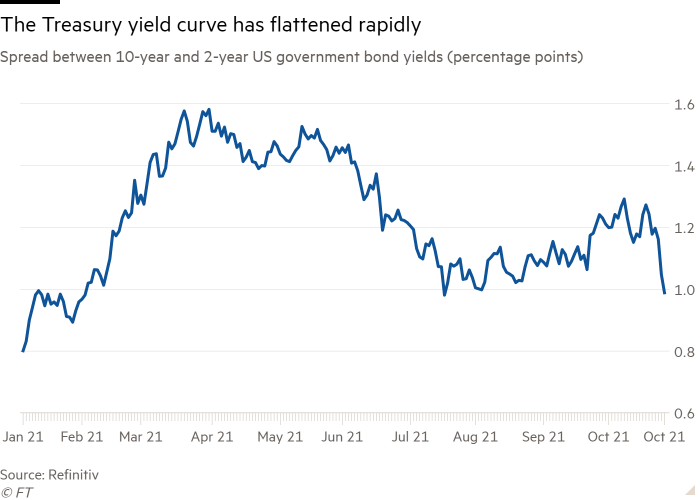A violent shake-up in bond markets has intensified as fund managers are wrongfooted by a global drop in short-term debt, say analysts and investors.
Stubbornly high inflation around the world and a hawkish response by some central banks have fuelled a rapid rise in short-dated government bond yields. At the same time, concerns about growth prospects in the coming years have kept a lid on long-term bond yields, resulting in a dramatic “flattening” of yield curves.
Short-term bond markets have “experienced unprecedented volatility” this week, said George Saravelos, Deutsche Bank’s global head of currency research. He said a sell-off in Australia’s market was the most severe since 1996, while Canada had been hit with its worst decline since 2009.
Saravelos said the moves have been exacerbated by investors being forced to abandon soured bets as markets move against them. “What is happening now runs beyond macro,” he said, using an industry phrase referring to economic trends. “This is the closest we can get to a distressed market.”
The upheaval was sparked by shifts in some relatively small government bond markets that generally do not affect others around the world. In Australia, higher-than-expected inflation figures this week prompted investors to aggressively sell short-term debt, prompting the central bank to abruptly ditch its yield target for three-year government bonds.
The Bank of Canada added to the short-end pullback by signalling it could raise rates as soon as the middle of next year. On the opposite end of the spectrum, longer-dated debt in the UK rallied on Thursday after the government slashed its debt issuance plans.
But the moves have driven a broader shift in global markets, reshaping yield curves around the world. In the US, the gap between two-year and 10-year bond yields has plunged to its narrowest level since the summer. US Treasuries have been hit by the biggest swings in eight months, according to an index compiled by Ice Data Services that tracks volatility in the world’s biggest bond market.

“The Bank of England and Bank of Canada are normally not huge movers for the US, but it’s clear they have been in this instance,” said Tom Graff, head of fixed income at Brown Advisory. Higher yields on sovereign debt outside of the US — which means investors get paid more to hold those foreign bonds — could reduce demand for Treasuries, said Graff.
Even the European Central Bank, which this week pushed back against bets on a 2022 rate rise, has appeared powerless to fight the sell-off, which was given further impetus by figures on Friday showing eurozone inflation surged to 4.1 per cent in September.
In the UK, investors such as hedge funds had positioned for a steeper yield curve, betting that the impending end of BoE bond purchases would undermine longer-dated debt, pushing up yields, according to Theo Chapsalis, head of UK rates strategy at NatWest Markets. But after the unexpectedly large cut in the government’s debt issuance plans, many of those investors have been forced to buy longer-dated bonds — and sell short-dated ones — to exit their “steepener” positions as markets moved against them.
“The steepener is a trade that a lot of people keep going back to, but most of the time it causes them trouble rather than joy,” Chapsalis said.
Bloomberg reported on Wednesday that hedge fund Rokos Capital Management was among the investors unwinding steepeners after losses of 11 per cent this month. Macro hedge funds such as Rokos make bets on the shape of the yield curve, so this month’s losses may be attributable to a misguided bet on a steeper curve.
“The word on the street was that a lot of this had to do with position unwinding,” said Graff.
"term" - Google News
October 29, 2021 at 04:49PM
https://ift.tt/3mp23PN
Bad bets trigger waves of tumult in short-term bond markets - Financial Times
"term" - Google News
https://ift.tt/35lXs52
https://ift.tt/2L1ho5r
Bagikan Berita Ini

















0 Response to "Bad bets trigger waves of tumult in short-term bond markets - Financial Times"
Post a Comment